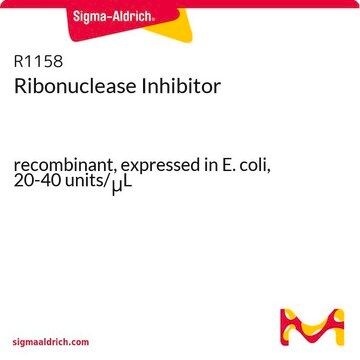A4464
Enhanced Avian Reverse Transcriptase [eAMV™ RT]
For reverse transcription at higher temperatures & rare mRNAs
About This Item
Recommended Products
form
crystalline powder
usage
sufficient for 50 reactions
feature
dNTPs included: no
hotstart: no
concentration
20 units/μL
technique(s)
RT-PCR: suitable
color
colorless
input
purified RNA
shipped in
wet ice
storage temp.
−20°C
Looking for similar products? Visit Product Comparison Guide
Related Categories
General description
Application
Biochem/physiol Actions
Features and Benefits
- Greater sensitivity for low abundance mRNA
- Unsurpassed transcription through difficult secondary structures at elevated temperatures (up to 65°C)
- Efficient generation of full-length cDNA, up to 14.1 kb
- Produces first strand cDNA ready for PCR amplification
Packaging
Unit Definition
Legal Information
Storage Class Code
10 - Combustible liquids
WGK
WGK 3
Flash Point(F)
Not applicable
Flash Point(C)
Not applicable
Personal Protective Equipment
Certificates of Analysis (COA)
Search for Certificates of Analysis (COA) by entering the products Lot/Batch Number. Lot and Batch Numbers can be found on a product’s label following the words ‘Lot’ or ‘Batch’.
Already Own This Product?
Find documentation for the products that you have recently purchased in the Document Library.
Customers Also Viewed
Articles
Challenges in gene expression analysis include mRNA stability, temporal transcription patterns, and mRNA-protein correlation, impacting accuracy.
Challenges in gene expression analysis include mRNA stability, temporal transcription patterns, and mRNA-protein correlation, impacting accuracy.
Challenges in gene expression analysis include mRNA stability, temporal transcription patterns, and mRNA-protein correlation, impacting accuracy.
Challenges in gene expression analysis include mRNA stability, temporal transcription patterns, and mRNA-protein correlation, impacting accuracy.
Related Content
RT-qPCR detects specific targets with applications in gene expression and pathogen detection.
RT-qPCR detects specific targets with applications in gene expression and pathogen detection.
RT-qPCR detects specific targets with applications in gene expression and pathogen detection.
RT-qPCR detects specific targets with applications in gene expression and pathogen detection.
Our team of scientists has experience in all areas of research including Life Science, Material Science, Chemical Synthesis, Chromatography, Analytical and many others.
Contact Technical Service









